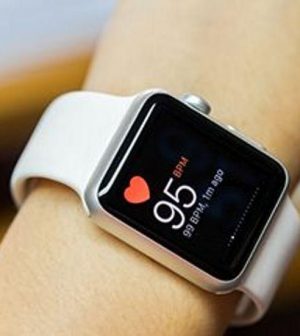- Recognizing the Signs of Hypothyroidism
- 10 Strategies to Overcome Insomnia
- Could Artificial Sweeteners Be Aging the Brain Faster?
- Techniques for Soothing Your Nervous System
- Does the Water in Your House Smell Funny? Here’s Why
- Can a Daily Dose of Apple Cider Vinegar Actually Aid Weight Loss?
- 6 Health Beverages That Can Actually Spike Your Blood Sugar
- Treatment Options for Social Anxiety Disorder
- Understanding the Connection Between Anxiety and Depression
- How Daily Prunes Can Influence Cholesterol and Inflammation
Fitness Trackers Are Revealing COVID’s Long-Term Effects

(Healthday News) — Wearable fitness trackers such as Fitbits or the Apple Watch can help track people’s recovery from COVID-19 and are revealing just how long-term that recovery is, according to a new study.
It was conducted from late March of 2020 to late January of 2021, and included 875 Fitbit-wearing people, 234 of who tested positive for COVID-19.
Data from the wearable devices showed that people who tested positive for COVID-19 had behavioral and physiological symptoms, including an increased heart rate, that could persist for weeks or months, The New York Times reported.
These symptoms lasted longer in people with COVID-19 than in those with other respiratory illnesses, according to researchers from the Scripps Research Translational Institute in La Jolla, Calif.
It took 79 days, on average, for their resting heart rates to return to normal, compared with just four days for those in the non-COVID group.
This may be a sign that COVID-19 disrupts the autonomic nervous system, which regulates basic physiological processes. The heart palpitations and dizziness reported by many COVID sufferers may be symptoms of this disruption, the researchers said.
“Lots of people who get COVID end up getting autonomic dysfunction and a kind of ongoing inflammation, and this may adversely affect their body’s ability to regulate their pulse,” Jennifer Radin, an epidemiologist at Scripps who led the trial, told the Times.
“We want to kind of do a better job of collecting long-term symptoms so we can compare the physiological changes that we’re seeing with symptoms that participants are actually experiencing,” Radin said. “So this is really a preliminary study that opens up many other studies down the road.”
The study was published Wednesday in the journal JAMA Network Open.
“This was an interesting study, and I think it’s important,” Dr. Robert Hirten, a gastroenterologist and wearables expert at the Icahn School of Medicine at Mount Sinai in New York City, told the Times. “Wearable devices offer an ability for us to be able to monitor people unobtrusively over long periods of time to see in an objective way — how really has the virus affected them?”
Hirten was not involved in the study.
Several previous studies have suggested that wearable fitness trackers — which can gather data on heart rate, body temperature, physical activity and other health information — may also help detect the early signs of COVID-19, the Times reported.
About 1 in 5 Americans use such devices.
More information
Visit Johns Hopkins Medicine for more on smart watches and health.
SOURCE: The New York Times
Source: HealthDay
Copyright © 2026 HealthDay. All rights reserved.










